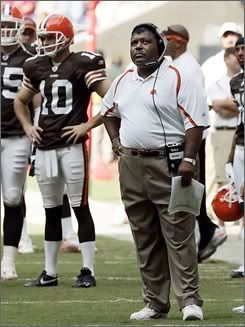 Of all the things Cleveland sports fans can select to worry about, you'd think the coaches of their teams wouldn't be one of them.
Of all the things Cleveland sports fans can select to worry about, you'd think the coaches of their teams wouldn't be one of them.Cleveland's current coaches -- the Indians' Eric Wedge, the Browns' Romeo Crennel and the Cavaliers' Mike Brown -- all come from the type of background you'd expect rising head coaches to have. Wedge is a gifted orator and organizational whiz kid from the Tribe's own farm system, one of the most meticulously self-analyzed in all of baseball.
Crennel is an apple off the Bill Parcells coaching tree who had Bill Belichick for a mentor. Brown counts Bernie Bickerstaff, Gregg Popovich and Rick Carlisle among his mentors.
Prior to Crennel was Butch Davis, who was a protege of Jimmy Johnson. Prior to Wedge was Charlie Manuel, a stuttering bumpkin to hear him speak, but in actuality a smart, well-traveled baseball man. He was the mechanic of the most-feared baseball offense of the 1990s.
Virtually all Cleveland coaches have had a list of job references long and famous enough to make your average Monster.com subscriber salivate.
And yet with all that immaculate pedigree and extensive sideline preparation, each Cleveland team has made just one playoff appearance in this decade. The Indians have finished above .500 thrice since 2000, the Cavs twice and the Browns just once.
So where does all that perceived ability go when a coach is hired by a Cleveland team? If you want to go on a witch hunt and look for another long, dark corridor in the complex labyrinth that is the Cleveland curse, save your legs. The answer doesn't involve that much voodoo.
If you want to look for answers, take a look at the combined number of games that Wedge, Crennel and Brown had served as a head coach prior to their current gigs:
Zero.
In the case of Crennel and Brown, zero on any level.
Inexperience is a near-epidemic among Cleveland head coaches. In 60 years, the only Browns head coach with prior NFL head coaching experience was Nick Skorich, and even then, he hadn't been a head coach for almost a decade upon receiving the job in 1971.
The last Indians manager with prior experience was John McNamara, at the tail end of a career that will be mostly remembered for him sticking with Bill Buckner defensively in Game 6 of the 1986 World Series, setting the stage for one of baseball's immortal gaffes.
McNamara lasted from the middle of the 1990 season to the middle of the '91 season, when he was replaced by Mike Hargrove.
The Cavs have been the least offensive when it comes to hiring coaches without experience. Since 1986, Lenny Wilkens, Mike Fratello, John Lucas and Paul Silas were all hired with extensive prior experience as NBA head coaches.
But then, one has to ask, with the most important player in franchise history entering his prime years, why deviate from that and roll the dice by hiring Brown?
No one doubts that Brown, Crennel and Wedge all know a lot about their respective sports. No one who knows what they are talking about thinks these guys are idiots. But the danger of hiring a guy with no experience is that he's not going to be able to take a holistic view of the team.
No, I'm not talking about yoga and tea leaves. As professional sports become more complex and technology-driven, coaching staffs become more compartmentalized. Assistant coaches are allowed to retreat into their area of specialization with only limited regard for what else is going on.
Brown and Crennel got to where they are by burying their noses in their defensive playbooks. Offense fell on the shoulders of another assistant coach. Motivating the troops was something the head coach handled, or in some cases, the players themselves.
Wedge got to where he is by being a good interview, having good organizational skills and having the good fortune of being on the same mental wavelength as his boss, which never hurts.
No one ever tested Wedge's in-game strategic skills prior to him becoming the Indians manager. No one ever tested the ability of Crennel or Brown to work an offense. No one ever tested the skills of any of the three in handling a locker room full of subordinates who go through mood swings just like the rest of us.
The leap from concepts to reality is the toughest jump to make when you have to pry your nose out of a playbook and start managing people, or dispense with the platitudes of a fiery first-day-of-spring-training speech and start leading your team through the seven-month march of a baseball season.
Before you finger Wedge's aversion to base-stealing, or accuse Crennel and Brown of being cave-bat blind when it comes to offense, realize that it's the leadership skills they lack. Realize that the biggest part of their on-the-job training as head coaches comes when they have to pull in the reigns on a slumping club and hold them accountable. That's where all three Cleveland coaches lack the most.
The trouble is, that's probably the most important part of a coach's job.
The best coaches inspire their teams and get their players to a point where they feel an effective amount of shame in failure. Coaches of great teams might be tactical geniuses, yes, but chances are they are simply pushing the right psychological buttons.
That's the wide-angle view of a team that only experience can teach a coach. And, unfortunately, experience is in short supply among Cleveland coaches.
Jan 30, 2007 7:00 PM